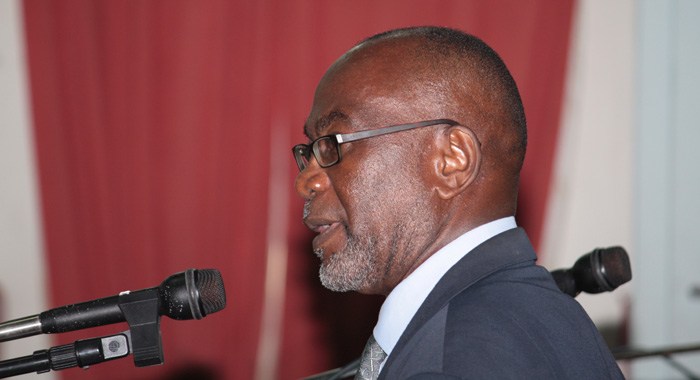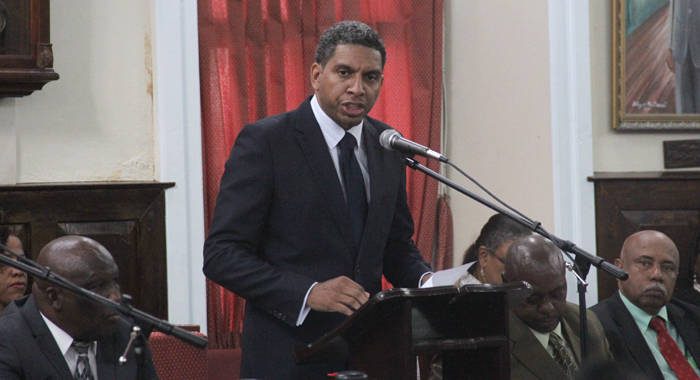Minister of Finance, Camillo Gonsalves has denied that special warrants were used to pay for work done for the ruling Unity Labour Party.
Under the Finance Administration Act, special warrants are to be used to finance expenditures that are unforeseen, foreseen and not provided for or not sufficiently provided for and required for the public good in circumstances such that the expenditure cannot, in the opinion of the minister, be postponed without injury to the public good.
However, Member of Parliament for Central Kingstown, St. Clair Leacock, and opposition lawmaker, said that some of the EC$123 million in the spending done via special warrants between 2014 and 2018 was for work done on behalf of the ULP.
Last Thursday, Gonsalves, in wrapping up the debate ahead of Parliament’s approval of the spending, applauded Leacock for raising the issue of special warrants not having been approved since 2014.
He said that in raising the issue, the opposition lawmaker had put it back on the front burner, his advocacy having lit the fire.
“I accept that. But, he made some comments there as he got heated about us using special warrants to fund ULP activities or non-state expenditure for ULP purposes. That was beyond the pale,” Gonsalves told Parliament.
“And he said he would reveal it but decided against it. In other words, it is a bald and baseless and unfounded allegation. And it is unfortunate that somebody who had raised and issue and had championed it, and, of course, everybody has to play their politics, would descend to those depths in the concluding moments of his presentation,” Gonsalves said.

In his contribution to the debate, Leacock said:
“There is expenditure in these special warrants paid to individuals that have nothing to do with the public service, for not providing any public good, or any public service but solely for providing opportunities for the government regime and they should have paid for it.
“But because of the state of the individuals, I choose tonight not to embarrass them or their families on the basis of my personal good relationship by calling names. But don’t push me. Don’t push me. Don’t push the envelope.”
Responding to cross talk, Leacock doubled down, saying: There are individuals here receiving payments and the service for which they provided is not for the state of St. Vincent and the Grenadines. It’s for the Unity Labour Party. I say that”
Someone across the aisle told Leacock he did not know what he was saying.
Leacock retorted: “I ain’t know what I saying? Yo’ want me go to the account number? But I have respect for the family and I feel their pain and suffering.”
The opposition lawmaker noted in his presentation that in 2007, two years after the ULP administration amended the Finance Administration Act, the director of audit spoke about the ease with which the government was spending money without the approval of Parliament, as prescribed by the Constitution.
“The Director of Audit was mad, hopping mad, displeased with the way government is doing its business, sufficient to put it on record the ease with which we get money, we’re finding ourselves too easy to spend money,” he said.
He told lawmakers it was not the first, second, or third time that the director of audit was raising such an issue.
He further said that Opposition Leader Godwin Friday was corrected when he noted that lawmakers were being asked to approve spending down under a previous Parliament.
“… the Parliament of 2010, 2015, when not only special warrants were not issued to account to the Parliament of that time, but we had the circumstances of which funds from the PetroCaribe fund did not go into the Consolidated Fund under the same Finance Act provision, never been audited by the Director of Audit, and millions of dollars spent without the authority of this parliament,” Leacock said.
He accused the government of attempting to pit sanitation workers against the opposition New Democratic Party, by highlighting that special warrants were also issued to ensure that sanitation workers were paid.
“They are all wising up now,” Leacock said of the sanitation workers.
“As a matter of fact, in many respects, the behaviour of this Honourable House is no different to the poor struggling people of Redemption Sharpes, Largo Height, Green Hill in Central Kingstown who can’t pay their light bill,” he said of villages in his constituency.
“The only difference is that VINLEC don’t cut them off summarily and name and shame them,” he added, referring to disconnection from the electricity grid due to payment default that causes social embarrassment to householders within their communities.
But Gonsalves said he believes that reasonable people will realise that a number of things are true, including that the government should not be bringing four years’ worth of special warrants to Parliament at once.
“But those same reasonable people would realise that when you have natural disasters, when you have health care crises, when you have unpaid bills that have to be paid, when you have accounting journalising to correct, sometimes, special warrants are necessary, “ he said,
Gonsalves said that is why special warrants are contemplated in the constitution, and the Finance Administration Act, and this is the case in countries around the world.
“And that our use of the special warrant has been within the four walls of the law, has represented the expenditures contemplated by the law and have prevented, in the opinion of this finance minister, injuries to the public good, as prescribed by the law that we have in my hand,” the finance minister told Parliament.







There has got be something highly illegal about these payments otherwise they would have been declared a long time ago. Is this some of the continuation work of Maurice Bishop? Was this an attempt to not keep two sets of books but to keep one set and simply discard the rest.
The NDP should demand an enquiry, after all this was an extremely serious breach of the constitution. Its like robbing a bank and admitting doing it four years later, expecting no consequence for committing the original crime.
Misconduct in public office is an offence at common law triable only on indictment. It carries a maximum sentence of life imprisonment. It is an offence confined to those who are public office holders and is committed when the office holder acts (or fails to act) in a way that constitutes a breach of the duties of that office, most often under purposeful breach of the constitution.
The offence should be strictly confined. It can raise complex and sometimes sensitive issues. The Director of Public Prosecutions [DPP] should be asked to resolve any uncertainty as to whether it would be appropriate to bring a prosecution for such an offence. In the failing by the DPP, there are other regional and international bodies that can be sort for advice on appropriate action and how to go about such an action.
Where there is clear evidence of one or more statutory offences, they should usually form the basis of the case, with the ‘public office’ element being put forward as an aggravating factor for sentencing purposes.
The decision of the Court of Appeal in Attorney General’s Reference No 3 of 2003 [2004] EWCA Crim 868 does not go so far as to prohibit the use of misconduct in public office where there is a statutory offence available. There is, however, earlier authority for preferring the use of statutory offences over common law ones. In R v Hall (1891) 1 QB 747 the court held that where a statute creates (or recreates) a duty and prescribes a particular penalty for a wilful neglect of that duty ‘the remedy by indictment is excluded’.
In R v Rimmington, R v Goldstein [2005] UKHL63 at paragraph 30 the House of Lords confirmed this approach, saying:
“…good practice and respect for the primacy of statute…require that conduct falling within the terms of a specific statutory provision should be prosecuted under that provision unless there is good reason for doing otherwise.”
The use of the common law offence should therefore be limited to the following situations:
Where there is no relevant statutory offence, but the behaviour or the circumstances are such that they should nevertheless be treated as criminal;
Where there is a statutory offence, but it would be difficult or inappropriate to use it. This might arise because of evidential difficulties in proving the statutory offence in the particular circumstances; or because the maximum sentence for the statutory offence would be entirely insufficient for the seriousness of the misconduct.
There is absolute oodles of case law and procedures in and throughout the Commonwealth. Perhaps even advice from the Commonwealth legal department should be initially requested.
Going into parliament and trying to make good a breach retrospectively is simply not good enough because the breach in this case was long out of date for rectification.
It, was not until the NDP complained, that any action was taken in trying to rectify this matter. But what would have happened if the NDP had not brought it to the attention of Parliament? Would it all have been lost in time? Or continued to be hidden from view?
I do not think that Camillo Gonsalves should deny what the entire country already knows. We have all seen that the government takes monies from one account designated for particular purposes and use that money for something else. I believe that the majority of the population is aware that the accountability and management of all revenue in Saint Vincent is a total mess.
What I would like to know is how much money the government has brought in for the covert CBI program and if any of that money has ever made it into the accounts. If it has not, what other moneies never made it into the accounts? What expenditures never made it into the accounts?
It has been said that many entities keep two sets of books including a former government of Grenada. Remember when the Saint Vincent Consulate in New York was found to not be keeping any accounts at all? Anyone trying to get an understanding of the accounts of Saint Vincent will find that they do not even know where to start!
It is possible that Camillo has learned finance from his father, meaning:…WE ARE ALL IN TROUBLE!
It requires some deep investigation to see just where the money went. We simply cannot just accept someone’s word for that.
Beverley, Camillo has obviously got some of his step-fathers traits.
Mr editer I find you not been fear with my comment. I am going to monitor your attitude in regards to who you decide to print comment about. I noticed the one about Mrs Bowman was not printed.Did I broke the law? And the one about the minister of finance did I broke the law.l think this is a platform for freedom of speech about eny body . all we have to do don’t break the law.l knows that you have work with Mrs Bowman sister.ls that the reason you did not print my comment? I will not ask the same question about the minister of finance l knows better.So I will like you to print all my comment if in them i don’t break the law.
Mr MAC your starting to crack, Kenton has been very selective of late and has not shown a lot of my comments either.